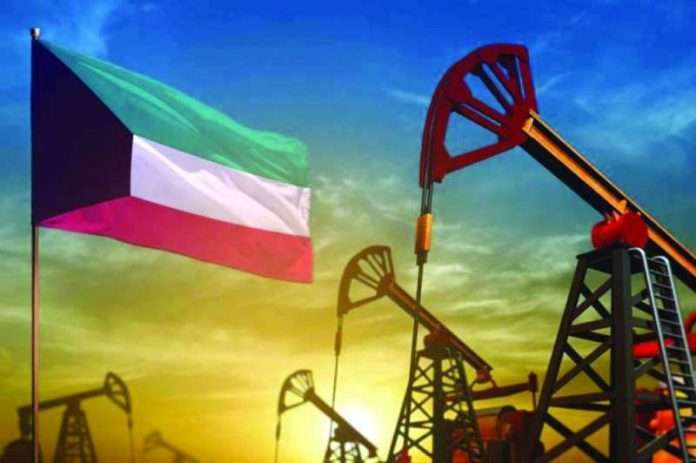Latest News
- Court Sentences Bank Employee To 5 Years For Embezzling 100,000...
- Fake ‘Sheikh’ Sentenced To 2-yr As Court Overturns Verdict
- Justice Ministry New Service On The Sahel App
- Ministry Probes 68 Cases Of Illegal Charity, Funds Collection
- Globally, Kuwait Is Among The Top Consumers Of Incense And Oud O...
- Decrease Seen In Foreign Investment
- Kuwait Customs Seized 2 Containers Laden With Tobacco At Shuwaik...
- Unpaid Salaries, Accountant Beaten Up By Workers
- The Sahel App Was Not Hacked, A Spokesman Claims
- Four Expats Arrested For Stealing Copper Cables Worth 60,000 Din...
- Indian National Died In Abdalli Car Accident
- Work Permits And Foreign Worker Transfers Are Amended By PAM
Oil Price Increase Significantly Reduces Deficit

Kuwait's oil income is expected to rise after oil prices rose to $139 a barrel yesterday. As a result, Kuwait's general budget deficit for the current fiscal year will be reduced. The current deficit is anticipated to be less than two billion Dinars. The deficit was formerly estimated to be around 12 billion Dinars.
According to three scenarios presented by a local Arabic newspaper regarding oil prices, the budget might have a deficit of 1.39 to 1.8 billion Dinars. This value is between 85 and 88.5 percent less than previous estimates. This is due to the growing price of oil and the revenue it will bring in.
The first scenario predicts that the current month's average price of a barrel of Kuwaiti oil will be $111.47. This will result in a daily oil income of roughly 77.8 million Dinars. During the month of March, this will total 2.41 billion Dinars. The statistic is based on an average daily sale of 2.3 million barrels, which includes domestic consumption.
When the price per barrel was 94.2 dollars, oil receipts in February were 1.841 billion dinars. According to the scenario, Kuwait's total oil revenue in February and March of this year will reach 4.25 billion dinars.
The entire oil earnings for the last 10 months was roughly 12.844 billion Dinars, according to the Ministry of Finance. Kuwait's entire oil earnings for the current fiscal year is now 17.095 billion dinars. This is an increase of 7.96 billion Dinars above the prior estimate of 9.127 billion Dinars.
When both oil and non-oil revenues (1.802 billion Dinars) are included for the current fiscal year, and it is assumed that government agencies would be able to reduce spending by 10%, the total revenue drops from 23.048 to 20.7 billion Dinars. A total deficit of around 1.8 billion Dinars will be recorded in the budget.
In the second scenario, the average price per barrel is only expected to hit $120 in March. This will be the situation if the United States and the European Union implement import prohibitions on Russian oil and Iranian crude returns to global markets with delays. Kuwait will earn around 2.6 billion dinars in oil revenues in March in this situation. According to this scenario, total oil revenue for the fiscal year will be 17.285 billion dinars. This equates to 8.16 billion dinars or 89.4% of the budget forecast of 9.127 billion dinars.
Total revenues will be 19.087 billion when non-oil revenues are added in. When the 10% cut in government spending is factored in, the deficit comes to 1.6 billion Dinars.
The third scenario is more bullish, estimating a $130 average price per barrel of Kuwaiti oil in March. In March, this will result in an oil income of 2.82 billion Dinars. Using this figure, Kuwait's total oil earnings is expected to reach 17.505 billion dinars this fiscal year, bringing the deficit to 1.39 billion dinars.
Crude oil hit $139.13 a barrel in the opening few minutes of trading yesterday, putting it at its highest level since 2008. The price of West Texas Intermediate crude has risen to $130.50 per barrel. This is the highest price level since July 2008. Fears of an impending inflationary shock to the global economy have arisen as a result of the figures.
Losing five million barrels of Russian oil from the market, according to Bank of America Chief Economist Ethan Harris, could quadruple oil prices to $200 a barrel and stifle global economic development. Brent could conclude the year at $185 a barrel, according to JPMorgan Chase, if Russian supply difficulties continue.
At OPEC, Kuwait's Governor, Muhammad Al-Shatti, ruled out compensation for Russian production if Western sanctions affected the Russian oil and gas sector. The sanctions may result in a lack of supplies on the market.
The latest events, according to Halima Croft, Head of Global Commodities and Strategy at RBC Capital Financial Services, may encourage countries to immediately buy more barrels of oil to replace the potential shortfall in Russian oil shipments. It is estimated that three to four million barrels of oil are produced every day.
Gas prices in Europe have risen to record highs of $3,300 per 1,000 cubic meters. Natural gas prices have also risen to an all-time high in European markets, as the US and the EU contemplate possible sanctions against Russian energy in the wake of the invasion of Ukraine.
Fears of an interruption in Russian exports, which account for 40% of European gas imports, have resulted in a 60% increase in European power costs to 300 Euros per megawatt-hour.
Gold's gains from yesterday have been extended. The Russian invasion of Ukraine has fuelled investor demand for safe-haven assets such as gold. In yesterday's trading, the price of gold surpassed $2,000 per ounce.
Gold prices in the market also increased by 1% to $1,986.29 per ounce. This is the highest level since early in the Asian session on August 19, 2020, when it hit $2,000.69 per ounce. The last bid in Spot trading for gold was $1,989.96.
Last Friday, holdings in the world's largest gold-backed exchange-traded fund, "SPDR Gold Trust," rose 0.4 percent to 1,054.3 tonnes, the highest since mid-March 2021. Other metals, such as Palladium, saw a 5.6 percent boost in value to $3170.49 per ounce.
Trending News
-
 Eid Al Fitr 2024: Crescent Moon Not Sighted In Sau...
08 April 2024
Eid Al Fitr 2024: Crescent Moon Not Sighted In Sau...
08 April 2024 -
 Kuwait Implements Home Biometrics Services Ahead O...
14 April 2024
Kuwait Implements Home Biometrics Services Ahead O...
14 April 2024 -
 When Will Eid Al Fitr 2024 Take Place In Qatar, Ba...
08 April 2024
When Will Eid Al Fitr 2024 Take Place In Qatar, Ba...
08 April 2024 -
 On Sunday, The Meteorological Department Warns Of...
07 April 2024
On Sunday, The Meteorological Department Warns Of...
07 April 2024 -
 Kuwait Airways Provides Update On Flight Schedule...
14 April 2024
Kuwait Airways Provides Update On Flight Schedule...
14 April 2024 -
 Gathering For Eid Al-Fitr Prayers: Kuwaiti Citizen...
10 April 2024
Gathering For Eid Al-Fitr Prayers: Kuwaiti Citizen...
10 April 2024 -
 Kuwait Airways Introduces Convenient Home Luggage...
15 April 2024
Kuwait Airways Introduces Convenient Home Luggage...
15 April 2024 -
 Winners Of Kuwait National Assembly 2024 Elections
06 April 2024
Winners Of Kuwait National Assembly 2024 Elections
06 April 2024 -
 Bay Zero Water Park Kuwait: Summer Season Opens Ei...
11 April 2024
Bay Zero Water Park Kuwait: Summer Season Opens Ei...
11 April 2024 -
 An Egyptian Expat Dies At Kuwait's Airport
11 April 2024
An Egyptian Expat Dies At Kuwait's Airport
11 April 2024












Comments Post Comment